 More stars than you can shake a stick at this week, some in iconic roles…and some not. Let’s start with The King.
More stars than you can shake a stick at this week, some in iconic roles…and some not. Let’s start with The King.
Where were you when Elvis Presley died? Given that it happened all of 36 years ago (Aug. 16, to be exact) some of you might not have been itches in your daddy’s pants. I remember comforting my distraught mother on that gray and stormy day, without much knowing why. It wasn’t until this Beatles-loving preteen grew up and visited Graceland, in 2004, that I understood the magic that had been long obscured by the “fat Elvis” jokes and “druggie Elvis” stories that multiplied after his passing, and my fiancÁ©e and I used the popular remix of “A Little Less Conversation” to kick off the dancing at our wedding a year later. That originally came from a movie, 1968’s Live a Little, Love a Little–and by and large there’s no rehabilitating a good swath of his films, some of which lack even a mildly memorable song. But 1956’s Love Me Tender got his secondary career off to a promising start, and now we have a sparkling Blu-ray of it–black-and-white CinemaScope is my favorite “look” for a movie, and Elvis’ debut has it in spades.
Noted Hollywood hands like Michael Curtiz (King Creole), Don Siegel (Flaming Star), and George Sidney (Viva Las Vegas) would more compellingly capitalize on Presley’s appeal, with the last film, pairing him with the irresistibly sexy Ann-Margret, his peak. (Such a fun movie.) Robert D. Webb, who directed nothing more notable than this, plunks the nascent actor into a plain-wrap Civil War Western, based loosely on a true story of thieving, squabbling Confederate brothers. The film wasn’t supposed to have any songs, but the pre-release sensation caused by “Love Me Tender” on the charts mandated three more tunes to be added and a title change from The Reno Brothers. Hoping for a different course on the big screen, Presley would lament the musicalization of his movies. That said he gets to show some acting chops here and gets a death scene, his one and only as it upset his fans, who surely would have demanded that he sing onscreen anyway had he persisted in trying to be the next James Dean. You’ll find numerous tidbits about the song, the impact of his movie debut, and his relationship with the endlessly cross-promotional Col. Tom Parker among the supplements, which include an affectionate commentary track by friend and biographer Jerry Schilling, all retained from the prior DVD release.
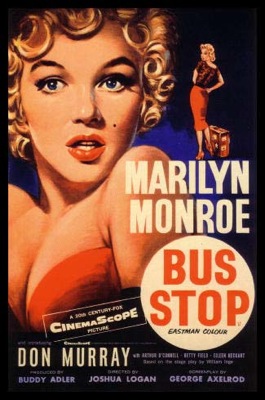 Where was I when Marilyn Monroe died on Aug. 5, 1962? Jeez, how old do you think I am? Maybe Ken Shane remembers (love ya, Ken!). In any event, Monroe got an anniversary Blu-ray box set last year (why are these always timed to the year of the death?) and here we have a couple of worthwhile remnants that make for a study in contrasts. 1953’s Niagara, directed by noir and Western specialist Henry Hathaway, is Marilyn reduced to scheming low-lifery, attempting with her lover to off her jealous husband, a depressed veteran (Joseph Cotten), at the falls, and falling in with naive newlyweds Jean Peters and Max Showalter in the process. Its success propelled Monroe to stardom, though viewed today her intentionally cold performance may be offputting to those who like her hot. Still, it has some expressive, noir-in-Technicolor moments, particularly in a mouth-watering transfer that renders the DVD obsolete, and the location shooting pays off with a genuinely exciting climax. Oh, and Peters gives Monroe a run for her money in the delectability department.
Where was I when Marilyn Monroe died on Aug. 5, 1962? Jeez, how old do you think I am? Maybe Ken Shane remembers (love ya, Ken!). In any event, Monroe got an anniversary Blu-ray box set last year (why are these always timed to the year of the death?) and here we have a couple of worthwhile remnants that make for a study in contrasts. 1953’s Niagara, directed by noir and Western specialist Henry Hathaway, is Marilyn reduced to scheming low-lifery, attempting with her lover to off her jealous husband, a depressed veteran (Joseph Cotten), at the falls, and falling in with naive newlyweds Jean Peters and Max Showalter in the process. Its success propelled Monroe to stardom, though viewed today her intentionally cold performance may be offputting to those who like her hot. Still, it has some expressive, noir-in-Technicolor moments, particularly in a mouth-watering transfer that renders the DVD obsolete, and the location shooting pays off with a genuinely exciting climax. Oh, and Peters gives Monroe a run for her money in the delectability department.
As stagy as Niagara is al fresco, 1956’s Bus Stop is nonetheless more of a crowdpleaser, spotlighting its star’s sass and warmth. Stage and screen director Joshua Logan had a screen hit with William Inge’s play Picnic the year before, and this Inge piece (actually two of his plays fitted together) again focuses on little people with big dreams. Fresh from the Actors Studio in New York, Monroe is Cherie, an Ozarks gal hoping to make it big in showbiz despite a certain deficit of talent. Her aspirational performance of “That Old Black Magic” at a Phoenix cafe (the movie’s highlight) puts a spell on brash cowboy Bo (Don Murray, in his film debut), who intends to get her back to the range no matter what, then learns a thing or two about how to treat a lady, even a somewhat compromised one, when stranded at the bus stop of the title. Bo is a pain (still, Murray received an Oscar nomination) and the sexual politics creak, yet the film is fondly remembered for Monroe’s sensitive performance. There’s little supplemental material on either disc to tear you away from her.
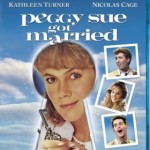 There’s nothing extra at all on the Blu-ray debut of Francis Ford Coppola’s Peggy Sue Got Married (1986), a barebones affair that nevertheless rescues an 80s favorite from an indifferent DVD. An 80s favorite for some, not for the filmmaker–after several independently produced duds, Coppola took this on as work-for-hire, a project to be endured rather than embraced, and was unhappy with nephew Nicolas Cage’s off-the-wall performance, as was star Kathleen Turner. (Given many more eccentric portrayals since, it’s normalized on his resume.) But Coppola imbues a wistful time travel story with some nice, low-fi touches, John Barry’s score is typically excellent, and, now that I’m older than Turner’s Peggy Sue, I feel her pangs of regret as she gets to go back in time to sort out some lingering family issues, not least with Cage, her faithless husband. The film, a modest success, landed Turner her only Oscar nomination in her salad days, but I liked it less than much of her spectacular run in the decade, where she shone from Body Heat (1981) to The War of the Roses (1989) before a hard landing. How hard? So hard that the box art makes over the design of the poster, which spotlit her alone, to include now-prominent co-stars Cage, Jim Carrey, and Helen Hunt. (Joan Allen’s in it, too. So for that matter is Don Murray.) Her performance, and the film, are however more resonant now.
There’s nothing extra at all on the Blu-ray debut of Francis Ford Coppola’s Peggy Sue Got Married (1986), a barebones affair that nevertheless rescues an 80s favorite from an indifferent DVD. An 80s favorite for some, not for the filmmaker–after several independently produced duds, Coppola took this on as work-for-hire, a project to be endured rather than embraced, and was unhappy with nephew Nicolas Cage’s off-the-wall performance, as was star Kathleen Turner. (Given many more eccentric portrayals since, it’s normalized on his resume.) But Coppola imbues a wistful time travel story with some nice, low-fi touches, John Barry’s score is typically excellent, and, now that I’m older than Turner’s Peggy Sue, I feel her pangs of regret as she gets to go back in time to sort out some lingering family issues, not least with Cage, her faithless husband. The film, a modest success, landed Turner her only Oscar nomination in her salad days, but I liked it less than much of her spectacular run in the decade, where she shone from Body Heat (1981) to The War of the Roses (1989) before a hard landing. How hard? So hard that the box art makes over the design of the poster, which spotlit her alone, to include now-prominent co-stars Cage, Jim Carrey, and Helen Hunt. (Joan Allen’s in it, too. So for that matter is Don Murray.) Her performance, and the film, are however more resonant now.
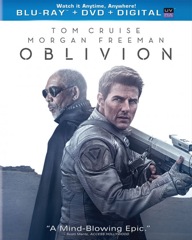 After his personal boxoffice best with 2011’s Mission Impossible: Ghost Protocol, Tom Cruise has been Tom Idle. No one wanted to see the 80’s squarest star as a metal god in Rock of Ages, and audiences did not grasp Jack Reacher. (It’s good, though, low key, an airport paperback thriller worth a rental, like The Lincoln Lawyer.) Now we have Oblivion, a title that just begs for jokes. Joseph Kosinski’s followup to Tron: Legacy is his revenge on the publishing industry, which passed on his graphic novel that became the film. Not hard to see why–it’s composed entirely of sci-fi spare parts that, while glossily assembled, add up to nothing special, however spectacular the Blu-ray transfer is. (And it is reference-quality.) In 2077, an alien race has decimated Earth, and what’s left of us is hightailing it to one of Saturn’s moons. Cruise, his memory wiped clean, is part of a mop-up crew making sure that the transfer comes off without a hitch…but, of course, there is a hitch, involving his partner and lover (the fine British actress Andrea Riseborough, giving the strongest performance), the “woman of his dreams” (Olga Kurylenko), who turns out to be entirely corporeal when Cruise uncovers a spaceship carrying her cryosleeping form, and an expositionary truthteller played by Morgan Freeman. A speculative fantasy freighted with little nods to everything that inspired it isn’t exactly going out on a limb, and so Oblivion, while not a total loss, never transcends its fundamental mission–to provide big studio comfort food, with an A-list star at home in action vehicles. Cruise and Kosinski go all in discussing the film on a commentary track, with other extras including a sturdy making-of, deleted scenes, and M83’s (good) isolated score. I think this was another case of my famous airships theory coming into play.
After his personal boxoffice best with 2011’s Mission Impossible: Ghost Protocol, Tom Cruise has been Tom Idle. No one wanted to see the 80’s squarest star as a metal god in Rock of Ages, and audiences did not grasp Jack Reacher. (It’s good, though, low key, an airport paperback thriller worth a rental, like The Lincoln Lawyer.) Now we have Oblivion, a title that just begs for jokes. Joseph Kosinski’s followup to Tron: Legacy is his revenge on the publishing industry, which passed on his graphic novel that became the film. Not hard to see why–it’s composed entirely of sci-fi spare parts that, while glossily assembled, add up to nothing special, however spectacular the Blu-ray transfer is. (And it is reference-quality.) In 2077, an alien race has decimated Earth, and what’s left of us is hightailing it to one of Saturn’s moons. Cruise, his memory wiped clean, is part of a mop-up crew making sure that the transfer comes off without a hitch…but, of course, there is a hitch, involving his partner and lover (the fine British actress Andrea Riseborough, giving the strongest performance), the “woman of his dreams” (Olga Kurylenko), who turns out to be entirely corporeal when Cruise uncovers a spaceship carrying her cryosleeping form, and an expositionary truthteller played by Morgan Freeman. A speculative fantasy freighted with little nods to everything that inspired it isn’t exactly going out on a limb, and so Oblivion, while not a total loss, never transcends its fundamental mission–to provide big studio comfort food, with an A-list star at home in action vehicles. Cruise and Kosinski go all in discussing the film on a commentary track, with other extras including a sturdy making-of, deleted scenes, and M83’s (good) isolated score. I think this was another case of my famous airships theory coming into play.
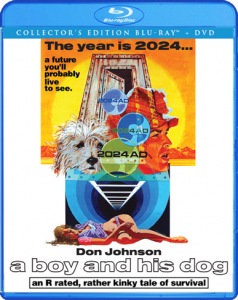 Miami Vice uplifted Don Johnson from a career in quirky indies, none better than 1975’s cult hit A Boy and His Dog. The flip side of the safely dystopian Oblivion, this is as mangy and R-rated as all get out, and genuinely probing, too, thanks to the bomb-throwing source material by Harlan Ellison and a smart, shoestring adaptation directed by Sam Peckinpah favorite and Casino co-star L.Q. Jones. Johnson is Vic, a far from noble savage roaming the nuclear wastelands of a ruined America (11 years to go!) with his dog, Blood, with whom he shares a telepathic link. (One of the best-trained movie mutts, played by The Brady Bunch‘s Tiger, Blood is voiced by the unmistakable Tim McIntire, who also contributed to the score, by Ray Manzarek and Jaime Mendoza-Nava.) In a typical only-in-the-70s scene, Vic mourns the discovery of a rape-murder victim, because he would have raped her himself, as Blood drops bon mots and philosophical asides. (And you were surprised to discover that Florence Henderson had a dark side.) When Vic and Blood fall in with an underground utopia headed by Jason Robards (a year away from All the President’s Men) and Alvy Moore (co-producer, co-writer, and Mr. Kimball on Green Acres), Vic thinks he’s got it made, given a repopulation effort dependent on his virility, but the matter is more complicated as revolution brews. Impudent and thought-provoking, and previously only available as eyesore DVDs, A Boy and His Dog goes Blu with a good transfer at last, complemented by a freewheeling commentary by Jones (a spry 85), DP John Arthur Morrill, and critic Charles Champlin, and an interview segment with Jones and Ellison, who stands by the effort but wasn’t entirely pleased by the departures from his work. Is it a coincidence that both this film and Oblivion are debuting on Blu-ray the week the latest entrant in the dying Earth sweepstakes, Elysium, opens in theaters?
Miami Vice uplifted Don Johnson from a career in quirky indies, none better than 1975’s cult hit A Boy and His Dog. The flip side of the safely dystopian Oblivion, this is as mangy and R-rated as all get out, and genuinely probing, too, thanks to the bomb-throwing source material by Harlan Ellison and a smart, shoestring adaptation directed by Sam Peckinpah favorite and Casino co-star L.Q. Jones. Johnson is Vic, a far from noble savage roaming the nuclear wastelands of a ruined America (11 years to go!) with his dog, Blood, with whom he shares a telepathic link. (One of the best-trained movie mutts, played by The Brady Bunch‘s Tiger, Blood is voiced by the unmistakable Tim McIntire, who also contributed to the score, by Ray Manzarek and Jaime Mendoza-Nava.) In a typical only-in-the-70s scene, Vic mourns the discovery of a rape-murder victim, because he would have raped her himself, as Blood drops bon mots and philosophical asides. (And you were surprised to discover that Florence Henderson had a dark side.) When Vic and Blood fall in with an underground utopia headed by Jason Robards (a year away from All the President’s Men) and Alvy Moore (co-producer, co-writer, and Mr. Kimball on Green Acres), Vic thinks he’s got it made, given a repopulation effort dependent on his virility, but the matter is more complicated as revolution brews. Impudent and thought-provoking, and previously only available as eyesore DVDs, A Boy and His Dog goes Blu with a good transfer at last, complemented by a freewheeling commentary by Jones (a spry 85), DP John Arthur Morrill, and critic Charles Champlin, and an interview segment with Jones and Ellison, who stands by the effort but wasn’t entirely pleased by the departures from his work. Is it a coincidence that both this film and Oblivion are debuting on Blu-ray the week the latest entrant in the dying Earth sweepstakes, Elysium, opens in theaters?
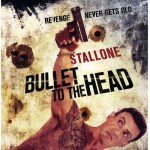 Sylvester Stallone, who played a 20th century “dinosaur” cop in Demolition Man 20 years ago, struggles to reboot himself in Bullet to the Head. With a chemically enhanced, and rather disturbing, physique and a clutch of tattoos, Stallone is a grumbling hit man paired, 48 HRS. style, with a cop (Sung Kang) as they comb the Big Easy for the killers of Stallone’s former partner and a corrupt policeman; many bullets to the head are fired as the gumbo ropes in another 80s survivor (Christian Slater) and fearsome Game of Thrones and new Conan star Jason Momoa. Hopes were higher as Walter Hill, the director of 48 HRS., helmed this one, which is based on a (sigh) graphic novel; it’s short, and proficient, like the best of Hill’s action cinema in the 70s through early 80s, but, like so many unsuccessful coattail riders, uninspired. (Stallone and Momoa’s duel with fire axes, a stirring battle, recalls Cobra.) A measly making-of is the only add-on to a slick Blu-ray transfer as the producers of fall’s Escape Plan, reteaming Sly with his faltering Expendables comrade Arnold Schwarzenegger, and the Christmas comedy Grudge Match, with Robert De Niro, sweat bullets. (Meanwhile, two credits from Hill’s glory days, 1975’s Hard Times and 1978’s The Driver, are available on Blu-ray on the Twilight Time label.)
Sylvester Stallone, who played a 20th century “dinosaur” cop in Demolition Man 20 years ago, struggles to reboot himself in Bullet to the Head. With a chemically enhanced, and rather disturbing, physique and a clutch of tattoos, Stallone is a grumbling hit man paired, 48 HRS. style, with a cop (Sung Kang) as they comb the Big Easy for the killers of Stallone’s former partner and a corrupt policeman; many bullets to the head are fired as the gumbo ropes in another 80s survivor (Christian Slater) and fearsome Game of Thrones and new Conan star Jason Momoa. Hopes were higher as Walter Hill, the director of 48 HRS., helmed this one, which is based on a (sigh) graphic novel; it’s short, and proficient, like the best of Hill’s action cinema in the 70s through early 80s, but, like so many unsuccessful coattail riders, uninspired. (Stallone and Momoa’s duel with fire axes, a stirring battle, recalls Cobra.) A measly making-of is the only add-on to a slick Blu-ray transfer as the producers of fall’s Escape Plan, reteaming Sly with his faltering Expendables comrade Arnold Schwarzenegger, and the Christmas comedy Grudge Match, with Robert De Niro, sweat bullets. (Meanwhile, two credits from Hill’s glory days, 1975’s Hard Times and 1978’s The Driver, are available on Blu-ray on the Twilight Time label.)
 Finally, Choi Min-Sik. Who? Only one of Korea’s biggest names, familiar from local hits like Shiri, I Saw the Devil, and Park Chan-wook’s Sympathy for Lady Vengeance and Oldboy, which Spike Lee has remade. Rumpled and charismatic, Choi in the exciting gangland saga New World plays a manipulative cop who from the shadows has manipulated an undercover agent (Lee Jung-jae) to near the top of a criminal conglomerate; when the head of the enterprise is bumped off, the power plays begin. Writer-director Park Hoong-jung (who wrote I Saw the Devil) weaves an intricate web, with many quarrelsome spiders, and doesn’t stint on just-business sadism (the film begins with a victim, beaten to a pulp, immersed in concrete and disposed of offshore) or action, like a parking garage melee whose filming highlights an impressionistic making-of included as an extra. New World is an excellent film with which to acquaint yourself with Choi and the new wave of gangster movies, a form in capable hands overseas.
Finally, Choi Min-Sik. Who? Only one of Korea’s biggest names, familiar from local hits like Shiri, I Saw the Devil, and Park Chan-wook’s Sympathy for Lady Vengeance and Oldboy, which Spike Lee has remade. Rumpled and charismatic, Choi in the exciting gangland saga New World plays a manipulative cop who from the shadows has manipulated an undercover agent (Lee Jung-jae) to near the top of a criminal conglomerate; when the head of the enterprise is bumped off, the power plays begin. Writer-director Park Hoong-jung (who wrote I Saw the Devil) weaves an intricate web, with many quarrelsome spiders, and doesn’t stint on just-business sadism (the film begins with a victim, beaten to a pulp, immersed in concrete and disposed of offshore) or action, like a parking garage melee whose filming highlights an impressionistic making-of included as an extra. New World is an excellent film with which to acquaint yourself with Choi and the new wave of gangster movies, a form in capable hands overseas.
And two TV colleagues, budding stars both (one with more hair than we’re used to seeing), in a clip from The Best of Fridays, available today on DVD:
[youtube width=”602″ height=”350″ video_id=”Gnn-YRyG1NA”]




Comments